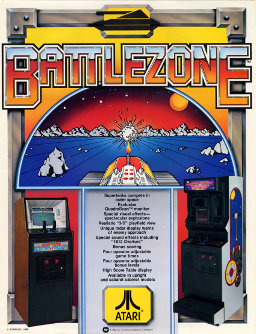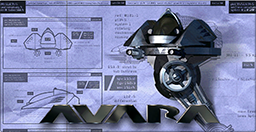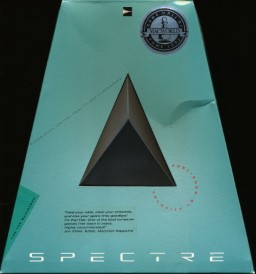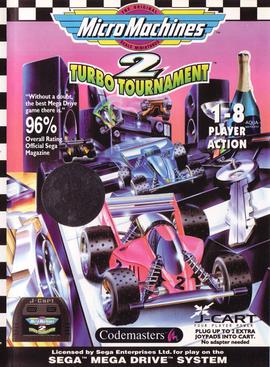AppleTalk is a discontinued proprietary suite of networking protocols developed by Apple Computer for their Macintosh computers. AppleTalk includes a number of features that allow local area networks to be connected with no prior setup or the need for a centralized router or server of any sort. Connected AppleTalk-equipped systems automatically assign addresses, update the distributed namespace, and configure any required inter-networking routing.

A/UX is a Unix-based operating system from Apple Computer for Macintosh computers, integrated with System 7's graphical interface and application compatibility. It is Apple's first official Unix-based operating system, launched in 1988 and discontinued in 1995 with version 3.1.1. A/UX requires select 68k-based Macintosh models with an FPU and a paged memory management unit (PMMU), including the Macintosh II, SE/30, Quadra, and Centris series.

Centipede is a 1981 fixed shooter arcade video game developed and published by Atari, Inc. Designed by Dona Bailey and Ed Logg, it was one of the most commercially successful games from the golden age of arcade video games and one of the first with a significant female player base. The primary objective is to shoot all the segments of a centipede that winds down the playing field. An arcade sequel, Millipede, followed in 1982.

Battlezone is a first-person shooter tank combat game released for arcades in November 1980 by Atari, Inc. The player controls a tank which is attacked by other tanks and missiles. Using a small radar scanner along with the terrain window, the player can locate enemies and obstacles around them in the barren landscape. Its innovative use of 3D graphics made it a huge hit, with approximately 15,000 cabinets sold.
A multiplayer video game is a video game in which more than one person can play in the same game environment at the same time, either locally on the same computing system, on different computing systems via a local area network, or via a wide area network, most commonly the Internet. Multiplayer games usually require players to share a single game system or use networking technology to play together over a greater distance; players may compete against one or more human contestants, work cooperatively with a human partner to achieve a common goal, or supervise other players' activity. Due to multiplayer games allowing players to interact with other individuals, they provide an element of social communication absent from single-player games.

Stars! is a turn-based strategy, science fiction 4X video game, originally developed by Jeff Johnson and Jeff McBride with help from Jeffrey Krauss for personal use, initially released as shareware for Microsoft Windows in 1995. A retail version was later produced for, and published by Empire Interactive, with developer Jason Gaston added to the team for quality assurance testing, although the shareware version continued.

Netatalk is a free, open-source implementation of the Apple Filing Protocol (AFP). It allows Unix-like operating systems to serve as file servers for Macintosh computers running macOS or Classic Mac OS.
Fantasy wrestling is an umbrella term representing the genre of role-playing and statistics-based games which are set in the world of professional wrestling. Several variants of fantasy wrestling exist which may be differentiated by the way they are transmitted, the method in which the storyline is determined, and how the roster is composed.

Spaceward Ho! is a turn-based science fiction computer strategy game that was written by Peter Commons, designed by Joe Williams and published by Delta Tao Software. The first version was released in 1990, and further upgrades followed regularly; the current version, 5.0.5, was released on July 8, 2003. It has received wide recognition in the Macintosh community, for example being inducted into the Macworld Game Hall of Fame.

Avara is a 1996 first-person shooter written by Juri Munkki for Macintosh and published by Ambrosia Software. A fast 3D engine, integrated Internet play, and easy level editing were notable features at the time of its release. While not commercially successful, the game found a cult following. Munkki publicly released the source code in 2016, the game's 20th anniversary.

Netopia, Inc., formerly Farallon Computing, Inc., was an American computer networking company that produced a wide variety of products including bridges, repeaters and switches, and in their later Netopia incarnation, modems, routers, gateways, and Wi-Fi devices. The company also produced the NBBS and, as Farallon, Timbuktu remote administration software, as well as the MacRecorder, the first audio capture and manipulation products for the Macintosh. Farallon originated several notable technologies, including:

Strategic Conquest is a turn-based strategy game based on the wargame Empire. It was written by Peter Merrill for the Apple Macintosh and released in 1984 by PBI Software, and later ported to the Apple II in 1986. Delta Tao Software took over distribution for later Classic Mac OS releases. It is sometimes shortened to Stratcon.
Stuart Cheshire is a Distinguished Engineer, Scientist and Technologist (DEST) at Apple. He pioneered Zeroconf networking while employed at Apple. Zeroconf was originally released by Apple as Rendezvous, but later renamed Bonjour. Subsequently, he co-authored the book Zero Configuration Networking: The Definitive Guide, published by O'Reilly, with Daniel H Steinberg.

Spectre is a video game for the Macintosh, developed in 1990 by Peninsula Gameworks and published in 1991 by Velocity Development. It is a 3D vector graphics tank battle reminiscent of the arcade game Battlezone. One sequel, Spectre VR, appeared on a number of lists of best video games.

GameFAQs is a video gaming website that hosts guides and other resources, as well as an active message board forum. It was created in November 1995 by Jeff Veasey and has been owned by Fandom, Inc. since October 2022. Allen "SBAllen" Tyner was lead Admin for twenty years until stepping down on October 18, 2023. The site is currently run by Community Manager "DToast" and Contributor Lead "ZoopSoul".
MacIP refers to a standard for encapsulating Internet Protocol (IP) packets within the AppleTalk DDP protocol. This allows Macintosh computers with LocalTalk networking hardware to access the normally Ethernet-based connections for TCP/IP based network services. This was an important bridging technology during the era when Ethernet and TCP/IP were rapidly growing in popularity in the early 1990s.

Wowhead is a website that provides a searchable database, internet forum, guides and player character services for the popular massively multiplayer online role-playing game World of Warcraft. It is owned and operated by ZAM Network LLC, a subsidiary of the Chinese company Tencent.

The Pippin is a defunct open multimedia technology platform, designed by Apple Computer. According to Apple, Pippin was directed at the home market as "an integral part of the consumer audiovisual, stereo, and television environment".

Bolo is a video game written by Jim Lane for the Apple II and published by Synergistic Software in 1982. It was inspired by Keith Laumer's 1976 science fiction novel Bolo: Annals of the Dinochrome Brigade, which featured self-aware tanks.

Micro Machines 2: Turbo Tournament is a 1994 racing video game developed by Supersonic Software and published by Codemasters for the Sega Mega Drive. The sequel to Micro Machines, the game is themed around Galoob's Micro Machines toys, and players race around environments in miniature toy vehicles. Micro Machines 2: Turbo Tournament adds new vehicles and game modes, and the Mega Drive version was released on J-Cart, enabling up to eight players without a multitap.















